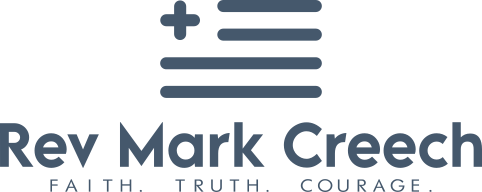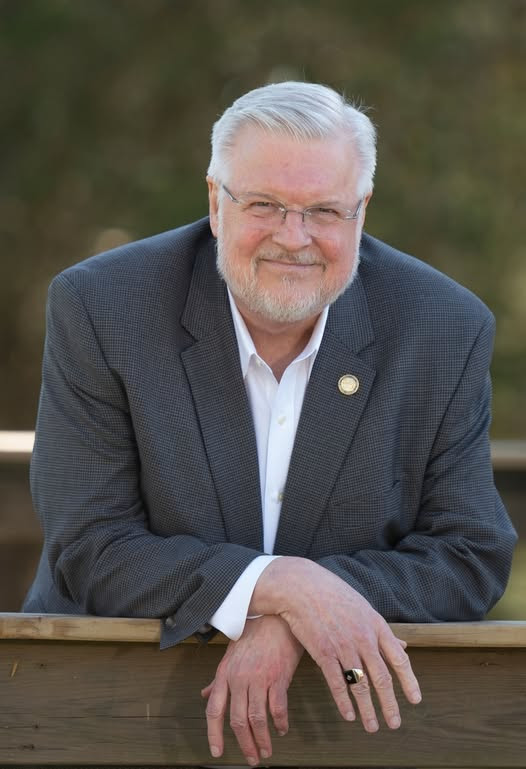By Rev. Mark Creech
In ministry, wounds can run deeper than the physical. Recently, I endured a painful injury, a broken shoulder, that not only required replacement surgery but also left me rather contemplative. As I reflected on that experience and its relation to a couple of other significant trials within a short span of eight months, I began to sense something more than a medical event was unfolding. It felt as though God was speaking through my pain, imprinting a message into the very marrow of my broken bones. Much like the limp Jacob carried after wrestling with God at Peniel, this brokenness seemed to carry symbolic weight – a reminder, not just for me, but perhaps for others who have had to shoulder too much responsibility.
The Old Testament tells us that Jacob wrestled with a mysterious man one night, and Jacob refused to release him without a blessing. Many scholars affirm this figure was no ordinary person but a theophany, which is a pre-incarnate appearance of the Lord Jesus Christ. Jacob had, quite literally, wrestled with God. Jacob had struggled through much of his life, relying on his own cunning and resourcefulness. In this divine encounter, however, one sacred touch dislocated his hip, and from that point forward, Jacob walked with a limp. The limp was no curse. It was a sign that marked a turning point in his life. Etched into Jacob’s own body was a lasting reminder of that moment when he was transformed from a man who strove in his strength alone to a man who learned to walk in the grace and power of God.
For years, my shoulders bore a heavy burden. As the executive director of a state-wide Christian public policy organization, I was solemnly tasked with defending and advancing biblical values amid tempestuous cultural headwinds. I was responsible for leading, managing, administering, fundraising, and serving as the public voice of the organization, most often without adequate support and insufficient financial resources.
And to be clear, unlike Jacob, I don’t believe I was operating in my own strength. From my earliest days of ministry, I sought to follow the Lord’s direction. I earnestly prayed. I relied on the Lord’s guidance by the Word and the Spirit. When things didn’t go as they should, I trusted the Lord implicitly. Still, even with a heart full of faith, I carried more than one man ever should.
How could I, someone who endeavored to stay close to God, allow this to happen? I think I know. It’s that too many times, I felt that there was no one else who would do what was needed. In the churches I served, leadership and members were frequently derelict in carrying their share of the load. The mindset seemed to be: “Let the pastor handle it. That’s what we pay him for.”
In the public square, the onus was no less demanding. There were so few pastors or church leaders willing to step up. The silence was deafening. So, by default, I picked up the slack. Again and again, over the years, I felt: If I don’t do this, who will? Over time, imperceptibly, I shouldered the unrealistic and heavy expectation that it was all up to me.
Moreover, I didn’t always ask for help as I should have either. Whether out of a desire to shield others, fear of burdening someone else, or a subconscious case of ‘Superman syndrome,’ I became complicit in taking on more than was reasonably necessary. This dynamic, too, was a part of the equation.
In hindsight, I realize this wasn’t only unsustainable but also dangerous. Ministry leaders frequently feel if something good is to be done, it must be done by them. When others neglect their part, whether in the church pew or the public square, the responsibility shifts significantly onto those few who remain steadfast. Yet, even the noblest yoke borne in sincerity can become oppressive.
This reminds me of the story of Moses in Exodus 18. He was doing everything, judging disputes, leading the people, guiding the nation, until his father-in-law, Jethro, intervened. “What you are doing is not good,” Jethro admonished Moses. “These people who come to you will only wear you out. The work is too grueling; you can’t handle this by yourself.” Jethro’s counsel was godly wisdom: delegate, share the load, and trust that God equips others as well. Moses listened, and the nation was better for it.
My body would eventually become a living symbol, a testimony to the very warnings the Jethros in my life had spoken. But I was too distracted by the tyranny of the urgent to heed their counsel. I took on more than my frame was forged to manage.
When the Church or ministry becomes primarily dependent on one person or a select group, something becomes distorted both within the divine order and in the leader’s soul. Scripture reminds us the Church is a Body, and no part is to bear the whole weight (1 Corinthians 12). When we step into that vacuum and don’t draw clear lines, we unwittingly reinforce the dysfunction and exhaust ourselves in the process.
This is the message the Lord was intent on driving home to me, and perhaps one that many pastors and church leaders need to recognize as well. The crisis confronting the Church today is not only one of cultural decline but also one of shared responsibility. Repeatedly, the work of the Kingdom has bowed the backs of the few while the many remained disengaged. The result is painfully predictable and heartbreaking: exhaustion, disillusionment, and, in some cases, complete collapse – crushed beneath a weight they were never meant to bear in isolation.
Much of what we observe among pastors today reflects this problem: pastoral burnout, attrition, mental health issues, and even faith deconstruction.
My broken shoulder has become a symbol to me, much like Jacob’s limp, which marked his divine encounter. The titanium in my arm and the lingering pain reminds me regularly that I am a part of the Body of Christ, but I am not the whole Body. What my mind and heart once refused to hear, my body now declares too loudly to ignore.
So, to every pastor, ministry leader, or weary saint worn too thin, I offer this word of grace: You may be doing more than your Master intended. Let that sink in.
Furthermore, to every church member, elder, deacon, and believer in the pew, let me say: Your presence matters. Your participation matters. Your prayers, service, and support are not fringe benefits of church life; they are essential to the health and mission of the Body. When you withhold them, others suffer. When you offer them, others stand.
My shoulder is no longer just a medical injury. It is a holy reminder engraved in bone and metal that none of us are meant to hold up the whole building – lest we be flattened beneath it.
But how about when a church leader recognizes the need to share the labor and finds no one with whom to share it? No willing hands. No strong shoulders. No Jethro to offer wise counsel. This, sadly, is the reality for so many. What then?
Then, like the apostle Paul, let these words rise within you: “But the Lord stood with me and strengthened me” (2 Timothy. 4:17). Like the psalmist, cry out: “When my heart is overwhelmed, lead me to the rock that is higher than I” (Psalm 61:2). Like our Lord in Gethsemane, fall to your knees, pour out your sorrow, and entrust yourself to Him who judges justly.
Still, be on guard: don’t be misled into thinking the absence of help is somehow the perfect will of God, and therefore, the full mantle is yours to bear indefinitely. It isn’t, and it mustn’t be. Even when a support system isn’t present, God’s grace remains sufficient for the need at hand. Nonetheless, pray persistently and trust that in His perfect timing, God will raise the needed help, perhaps from unexpected places.
In the meantime, steward both your calling and your limitations. Find comfort in knowing that your Savior, too, walked the path to Calvary with none to help Him. If, after a season of earnest prayer and patient waiting, the needed help and resources do not come, it may be proper to conclude that God will lead you to another place of service – a place where other hands will assist in upholding the ministry – just as it’s supposed to be.
May we learn what it means to share each other’s burdens – to shoulder the load together – lest we break.
In doing so, we fulfill the law of Christ (Galatians 6:2).


